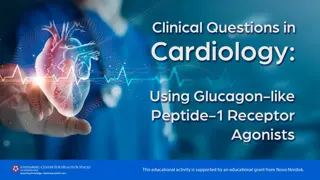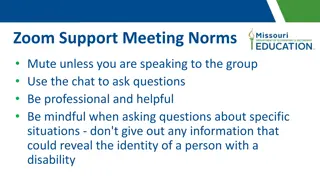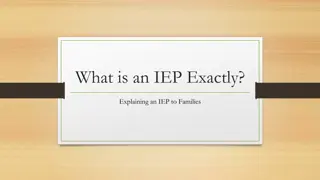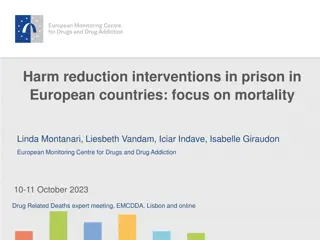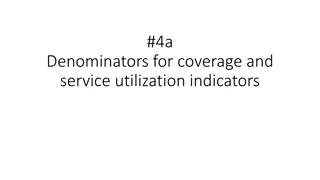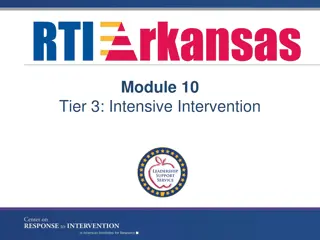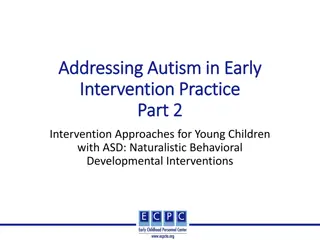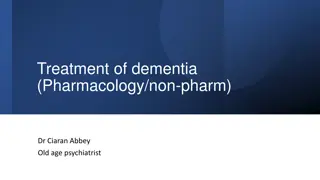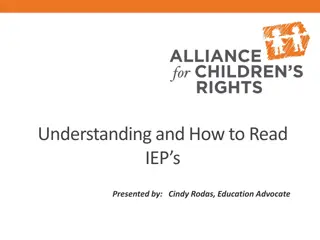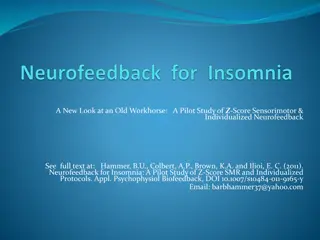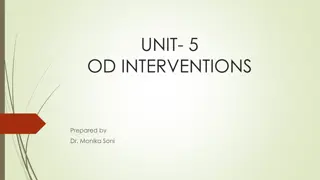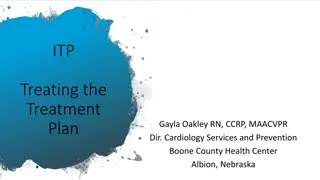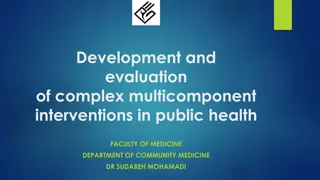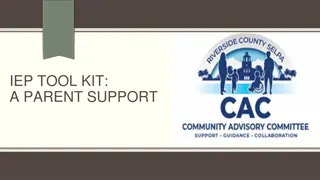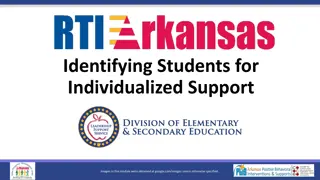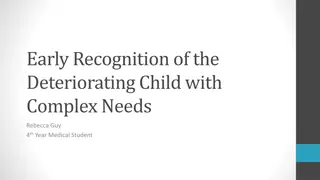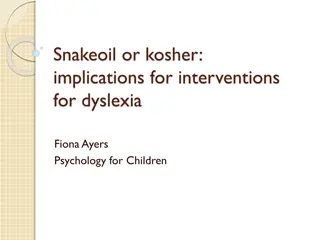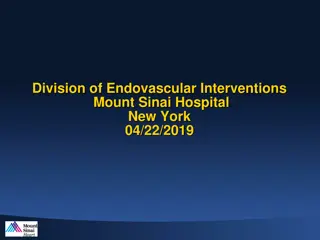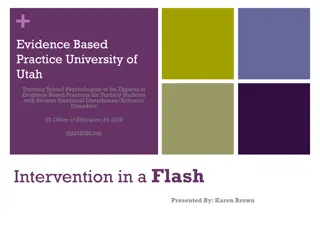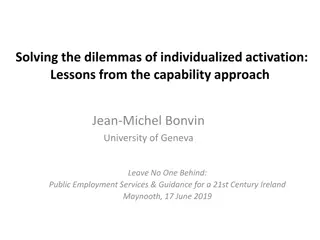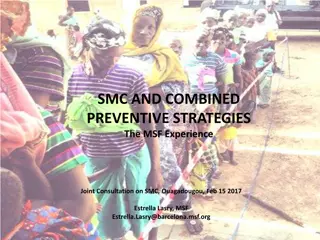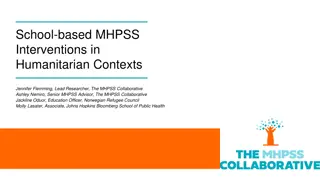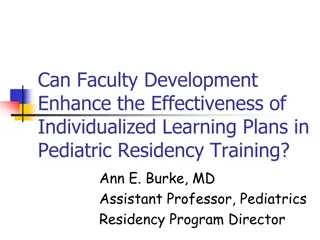Exploring Community Justice Interventions for Alcohol-Related Offenses
This presentation delves into the various community justice options available for individuals involved in alcohol-related offenses. It outlines the justice process post charges, community justice programs, national policies, successful examples like CPOs with alcohol treatment, challenges faced, and
1 views • 22 slides
Creating Individualized Resources for Employee Breaks in HR Management
Providing a master slide deck resource for HR professionals and managers to tailor individualized break strategies for their teams. The content covers the importance of breaks, ways to encourage and optimize breaks, and strategies at the individual, group, leader, and organizational levels. Breaks a
0 views • 69 slides
Comprehensive Update on Type 2 Diabetes Management and Cardiovascular Health
This update covers key aspects of managing type 2 diabetes and addressing cardiovascular risks, including discussions on GLP-1 receptor agonists, patient safety concerns, evidence-based recommendations, and individualized therapy approaches. It also includes a patient case study highlighting the imp
3 views • 52 slides
Behavior Progress Monitoring for Individualized Instructional Planning
Utilizing behavior progress monitoring allows educators to track student performance over time, make data-informed decisions to improve responsiveness to interventions, and tailor instructional plans for individual students. This comprehensive approach involves steps such as setting the stage, analy
6 views • 52 slides
Effective Strategies for Speech and Language Interventions in Education
Explore the crucial norms for Zoom meetings, guidelines for speech and language interventions, and the roles of speech-language pathologists in schools. Learn why these interventions are essential, focusing on providing educational relevance, cultural sensitivity, and supporting student progress wit
2 views • 40 slides
Understanding Individualized Education Plans (IEP) for Student Support
Individualized Education Plans (IEP) are tailored documents developed for students with special needs, providing a roadmap for educational support. The process involves assessments by a team including parents, teachers, and administrators. Parents can request an assessment for special education serv
1 views • 23 slides
Insights on Harm Reduction Interventions in European Prisons
Explore findings on mortality rates, drug use prevalence, and interventions in European prisons. Discover the impact of drug-related deaths, including NPS use, and the effectiveness of interventions like OAT and harm reduction strategies. Learn about the challenges and opportunities in addressing dr
0 views • 15 slides
Comprehensive Assessment of Denominators for Population Coverage and Service Utilization Indicators
This document outlines the importance of denominators in determining the percentage of the population reached by healthcare services. It covers a range of indicators for both preventive and curative services, providing insights on population projections, target populations, and specific intervention
2 views • 20 slides
Understanding Tier 3 Intensive Intervention in RTI Systems
This content delves into the critical features of Tier 3 interventions within Response to Intervention (RTI) frameworks. It covers the objectives of Tier 3 systems, designing and implementing interventions, problem-solving processes, essential components of RTI, evidence standards for interventions,
0 views • 64 slides
Understanding Naturalistic Developmental Behavioral Interventions for Children with ASD
This resource explores the history of autism interventions, focusing on Naturalistic Developmental Behavioral Interventions for young children with ASD. It covers theoretical approaches, specific needs met by NDBIs, examples of research-validated NDBI models, and common elements used in intervention
0 views • 53 slides
Comprehensive Overview of Dementia Treatment Strategies
Dementia, a syndrome resulting from various diseases affecting nerve cells and brain function, leads to cognitive decline. Treatment approaches include pharmacological and non-pharmacological interventions such as biomarker monitoring, lifestyle modifications, and addressing risk factors like hypert
0 views • 12 slides
Understanding and Reading Individualized Education Plans (IEPs) by Cindy Rodas: Key Insights
Gain valuable insights on understanding and reading Individualized Education Plans (IEPs) through this educational presentation by Cindy Rodas, an Education Advocate. Learn about the components of IEPs, examples, and essential tips. Explore topics such as the basics of Special Education, identifying
0 views • 24 slides
Neurofeedback for Insomnia: Pilot Study of Z-Score Sensorimotor & Individualized Protocols
This pilot study investigates the effectiveness of Z-Score Sensorimotor and Individualized Neurofeedback protocols for insomnia. Primary insomnia is defined, highlighting its impact and limitations of pharmacotherapy. Psychological treatments and challenges in service delivery are discussed, emphasi
4 views • 30 slides
Understanding Organizational Development Interventions
Organizational Development (OD) Interventions play a crucial role in enhancing organizational functioning and aiding managers in navigating team dynamics. These interventions encompass various techniques, including behavioral and non-behavioral approaches such as Sensitivity Training, Transactional
4 views • 17 slides
Evaluation of Evidence for Road Safety Policies in Canada
The study critically appraises the evidence underlying road safety policies in urban municipalities of Canada. Data was collected through an environmental scan in five cities, identifying various interventions in road safety policies. A total of 383 studies were analyzed across different categories
3 views • 30 slides
Comprehensive Approach to Treatment Planning in Cardiac and Pulmonary Rehabilitation
The duties of an Individualized Treatment Plan (ITP) in cardiac and pulmonary rehabilitation encompass a holistic approach involving exercise, nutrition, psychosocial aspects, and individualized components specific to each patient. Compliance with CMS Conditions of Coverage and a thorough understand
4 views • 37 slides
Meta-Evaluation of Private Sector Interventions in Agribusiness: Impacts and Methodologies
This meta-evaluation study explores the impact of access to finance and farmer/business training interventions on agribusiness indicators. It discusses the methodologies used in evaluations, highlighting the use of randomized control trials and quasi-experimental methods. Findings provide insights i
0 views • 25 slides
Innovative Approaches for Individualized Recovery in Severe Mental Illness
Embracing the recovery model for individuals with severe mental illness entails moving away from traditional approaches and focusing on values, shared decision-making, and community support. The hierarchy of needs profiles different levels of specialized services, while measurements include wellbein
0 views • 8 slides
Understanding Stroke-Specific Etiologies and Interventions for Falls in Inpatient Rehabilitation
Falls are a common complication after stroke, leading to hip fractures and various secondary complications. Inpatient rehabilitation often focuses on interventions to reduce stroke-related falls, considering factors like muscle tone, cognitive impairments, and balance deficits. Understanding these s
1 views • 27 slides
Specialty Courts and Recidivism Rates in the United States
Specialty Courts, such as Drug Courts and Problem-Solving Courts, provide intensive behavioral supervision and treatment for substance abuse and mental health issues. These courts aim to reduce recidivism rates and engage criminal offenders in therapeutic interventions. Nevada is actively running 42
1 views • 14 slides
Development and Evaluation of Complex Multicomponent Interventions in Public Health
A key concern in public health initiatives is the lack of emphasis on evaluation during implementation. Rushed introductions of new initiatives without adequate development lead to replacements before effectiveness is determined. Collaborative efforts between researchers and practitioners are crucia
0 views • 84 slides
Analysis of Obesity Prevention Interventions in Harford County, Maryland
This capstone project by Dr. Katherine Richardson explores obesity prevention interventions in Harford County, Maryland. Despite historical public health efforts, obesity rates continue to rise, necessitating a closer look at community-based interventions. By analyzing peer counties with similar dem
1 views • 14 slides
Understanding Individualized Education Programs (IEP) and Parent Support
The content provides information on Individualized Education Programs (IEP), the role of parents in supporting their child's education, and the collaborative process involved in developing an IEP. It includes details on the IEP team members, the contents of an IEP, tips for preparing for an IEP meet
0 views • 18 slides
Developing Entry Criteria for Tier III Interventions in Schools
This module focuses on helping schools establish entry criteria for Tier III interventions to identify students in need of individualized support. Participants will learn about the importance of relying on multiple sources such as existing school data, staff and family nominations, and universal scr
0 views • 60 slides
Making Educationally Appropriate Placements in Special Education
Explore the importance of making educationally appropriate and legally sound placement decisions in special education, ensuring Free Appropriate Public Education (FAPE) is provided in compliance with the Individualized Education Program (IEP) and the Least Restrictive Environment (LRE). Dive into th
0 views • 52 slides
Early Recognition of the Deteriorating Child with Complex Needs Study
This study explores the potential benefits of using individualized Pediatric Early Warning Score (PEWS) charts for children with complex neurological disabilities admitted with infections. By comparing standard age charts with patient-specific values, the aim is to improve specificity in recognizing
0 views • 11 slides
Challenges in Dyslexia Interventions: Snakeoil or Kosher?
Dyslexia, a spectrum of specific learning difficulties, poses challenges in reading, writing, and more. While the Ministry of Education recognizes dyslexia, there is a gap in tangible support for schools. Expectations have shifted with parents now seeking more tailored interventions. However, guidan
0 views • 49 slides
Endovascular Interventions at Mount Sinai Hospital: Case Study
Division of Endovascular Interventions at Mount Sinai Hospital, New York, treated a 71-year-old female patient with bilateral lower extremity claudication using endovascular procedures. The patient had a history of hypertension, diabetes, hyperlipidemia, and smoking, with peripheral artery disease a
0 views • 27 slides
Enhancing Interventions for Sex Offenders: The Dynamic Risk Guide
Explore the principles of effective interventions, current strategies for addressing sex offender needs, and incorporating dynamic risk factors to provide targeted interventions. Uncover insights from a survey highlighting areas for improvement and learn about the Dynamic Risk Guide tool aiding agen
0 views • 25 slides
Effective Interventions for Students with Academic Difficulties
University of Utah's evidence-based practices focus on training school psychologists to support tertiary students with serious emotional disturbance or behavior disorders. The "Interventions in a Flash" strategy helps struggling students acquire and retain basic skills like math facts and sight word
0 views • 23 slides
Understanding Free Appropriate Public Education (FAPE) in Special Education
FAPE in special education ensures that eligible students with disabilities receive individualized programs at no cost, meeting state standards. The concept, originating from the Supreme Court decision in Rowley, emphasizes the provision of educational benefits through an Individualized Education Pro
0 views • 55 slides
Lessons on Individualized Activation and Public Employment Services
Insights on implementing individualized activation strategies using the capability approach, focusing on real freedom, valuable job opportunities, and avoiding paradoxes in public policies. The lessons emphasize the importance of considering individual and contextual factors, adjusting program conte
0 views • 6 slides
Combination HIV Prevention Strategies and Interventions
Explore the comprehensive approach to HIV prevention through a combination of biomedical, behavioral, and structural interventions. Learn about the goals of prevention, the ecological model, and the various strategies such as biomedical interventions and behavioral interventions. Discover how these
0 views • 16 slides
Best Interventions for Sheep Value Chains in Ethiopia
The initial unedited version of interventions discussed at the Doyogena Multi-stakeholder Workshop in Ethiopia focuses on improving feed supply, providing training on sheep husbandry practices, and enhancing other input supply for small ruminant value chains. These interventions aim to increase the
0 views • 7 slides
Combined Preventive Strategies in Public Health Interventions
MSF's experience in implementing combined preventive strategies focusing on SMC, Vaccination, and Nutrition Screening in various countries like Mali, Niger, Chad, and Nigeria. The interventions aim to address malnutrition, improve vaccination coverage, and reinforce EPI programs. Advantages include
0 views • 7 slides
Explore the Flexible Individualized B.A. Degree Program
Discover the unique opportunities offered by the Individualized B.A. program, where you can design your own degree based on your interests and experiences. Learn about credit requirements, student-directed learning, and how to optimize your educational journey. Take control of your academic path and
0 views • 16 slides
Special Education Laws and Regulations in Massachusetts
Explore the laws and regulations governing special education in Massachusetts, including the Individuals with Disabilities Education Improvement Act (IDEA) at the federal level and Chapter 71B and 603 CMR 28.00 at the state level. Learn about key principles such as parent and student participation,
0 views • 12 slides
School-Based MHPSS Interventions in Humanitarian Contexts Realist Review
Conducted by a team of researchers and advisors, the realist review focuses on understanding the characteristics, mechanisms, and outcomes of school-based Mental Health and Psychosocial Support (MHPSS) interventions in humanitarian settings. The study aims to uncover how these interventions impact t
0 views • 21 slides
Enhancing Individualized Learning Plans in Pediatric Residency Training
The study focuses on whether faculty development intervention can enhance the effectiveness of Individualized Learning Plans (ILPs) in pediatric residency training. It aims to improve faculty and trainee experiences with ILPs, including increasing faculty perception of ILP importance, self-directed
0 views • 16 slides
Understanding Empathy Deficits in Offender Interventions
Overview of current practices in offender empathy interventions reveals mixed results and challenges in addressing empathy deficits. Research suggests the need for more person-specific measures targeting cognitive antecedents of empathy rather than generalized treatments. Developing a greater empiri
0 views • 18 slides


